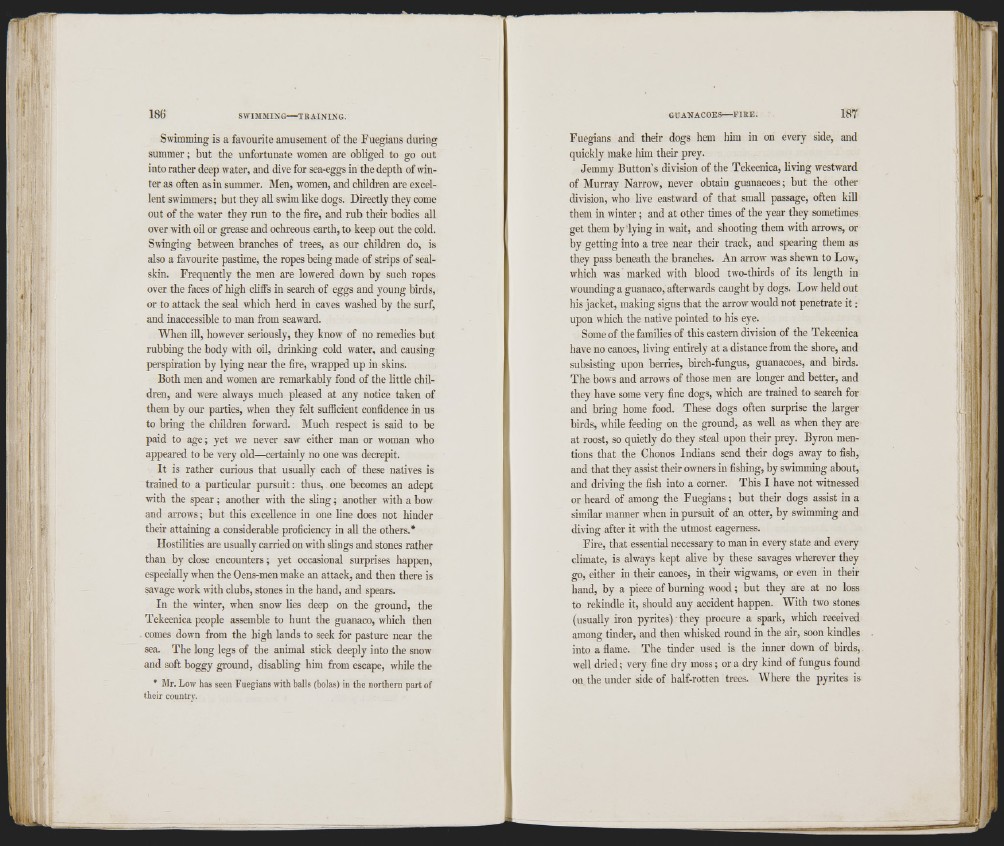
186 SWIMMING TRAINING.
Swimming is a favourite amusement of the Fuegians during
sum me r; b u t the unfortunate women are obliged to go out
into rather deep water, and dive for sea-eggs in the depth of winte
r as often as in summer. Men, women, and children are excellent
swimmers; bu t they all swim like dogs. Directly they come
ou t of the water they ru n to the fire, and ru b their bodies all
over w ith oil or grease and ochreous earth, to keep out the cold.
Swinging between branches o f trees, as our children do, is
also a favourite pastime, the ropes being made of strips of sealskin.
Freq u en tly the men are lowered down by such ropes
over the faces o f high chffs in search of eggs and 3'oung birds,
or to attack the seal which herd in caves washed by the surf,
and inaccessible to man from seaward.
W h e n ill, however seriously, th e j' know of no remedies b u t
ru bbing the body with oil, drinking cold water, and causing
perspiration by lying near th e fire, ivrapped u p in skins.
Both men and women are remarkably fond of the little children,
and were always much pleased a t any notice taken o f
them h y our parties, when they felt sufficient confidence in us
to b rin g the children forward. Much respect is said to be
paid to ag e ; yet we never saw either man or woman who
appeared to be very old—certainly no one was decrepit.
I t is ra th e r curious th a t usually each o f these natives is
trained to a particular p u r s u it: thus, one becomes an adept
with the sp e a r; another with the s lin g ; another with a bow
and arrows; b u t this excellence in one line does not hinder
their attaining a considerable proficiency in all the others.*
Hostilities are usually carried on with slings and stones rather
than by close encounters; yet occasional surprises happen,
especially when the Oens-men make an attack, and then there is
savage work with clubs, stones in the hand, and spears.
In the winter, when snow hes deep on the ground, the
Tekeenica people assemble to h u n t the guanaco, which then
comes down from the high lands to seek for pasture near the
sea. T h e long legs of the animal stick deeply into the snow
and soft boggy ground, disabling him from escape, whUe the
' Mr. Low has seen Fuegians with balls (bolas) in the northern part of
their country.
tP ih
GUANACOES FIRE. 187
Fuegians and their dogs hem him in on every side, and
quickly make him their prey.
Jemmy B u tto n ’s division of the Tekeenica, living westward
of Murray Nai-row, never obtain guanacoes; b u t th e other
division, who live eastward of th a t small passage, often kill
them in winter ; and a t other times of the year they sometimes
g et them by lying in wait, and shooting them with arrows, or
by getting into a tree near their track, and spearing them as
they pass beneath the branches. An arrow was shewn to Low,
which was marked with blood two-tlurds o f its length in
wounding a guanaco, afterwards caught b y dogs. Low held o u t
his jacket, making signs th a t the arrow would not penetrate i t :
upon which the native pointed to his eye.
Some of the families of this eastern division of the Tekeenica
have no canoes, living entirely a t a distance from the shore, and
subsisting upon berries, birch-fungus, guanacoes, and birds.
T h e bows an d arrows of those men are longer and better, and
they have some very fine dogs, which are trained to search for
and b rin g home food. These dogs often surprise the larger
birds, while feeding on the ground, as well as when they are
at roost, so quietly do they steal upon their prey. Byron mentions
th a t the Chonos Indians send their dogs away to fish,
and th a t they assist their owners in fishing, by sivimming about,
and driving the fish into a corner. T h is I have no t witnessed
or heard of among the F u e g ia n s ; b u t th eir dogs assist in a
similar manner when in p ursuit of an otter, by swimming and
diving after it with the utmost eagerness.
F ire , th a t essential necessary to man in every state and every
climate, is always kept alive by these savages wherever they
go, either in their canoes, in their wigwams, or even in their
hand, by a piece of burning wood; b u t they are a t no loss
to rekindle it, should any accident happen. W ith two stones
(usually iron pyrites) they procure a spark, which received
among tinder, and then whisked round in the air, soon kindles
into a flame. T h e tinder used is the inner down o f birds,
well dried; very fine dry moss; o r a dry kind o f fungus found
ou the under side of half-rotten trees. Where the pyrites is
V t'
li'l
i t
■itJi
0 'ili
■rm
i l
ll:.